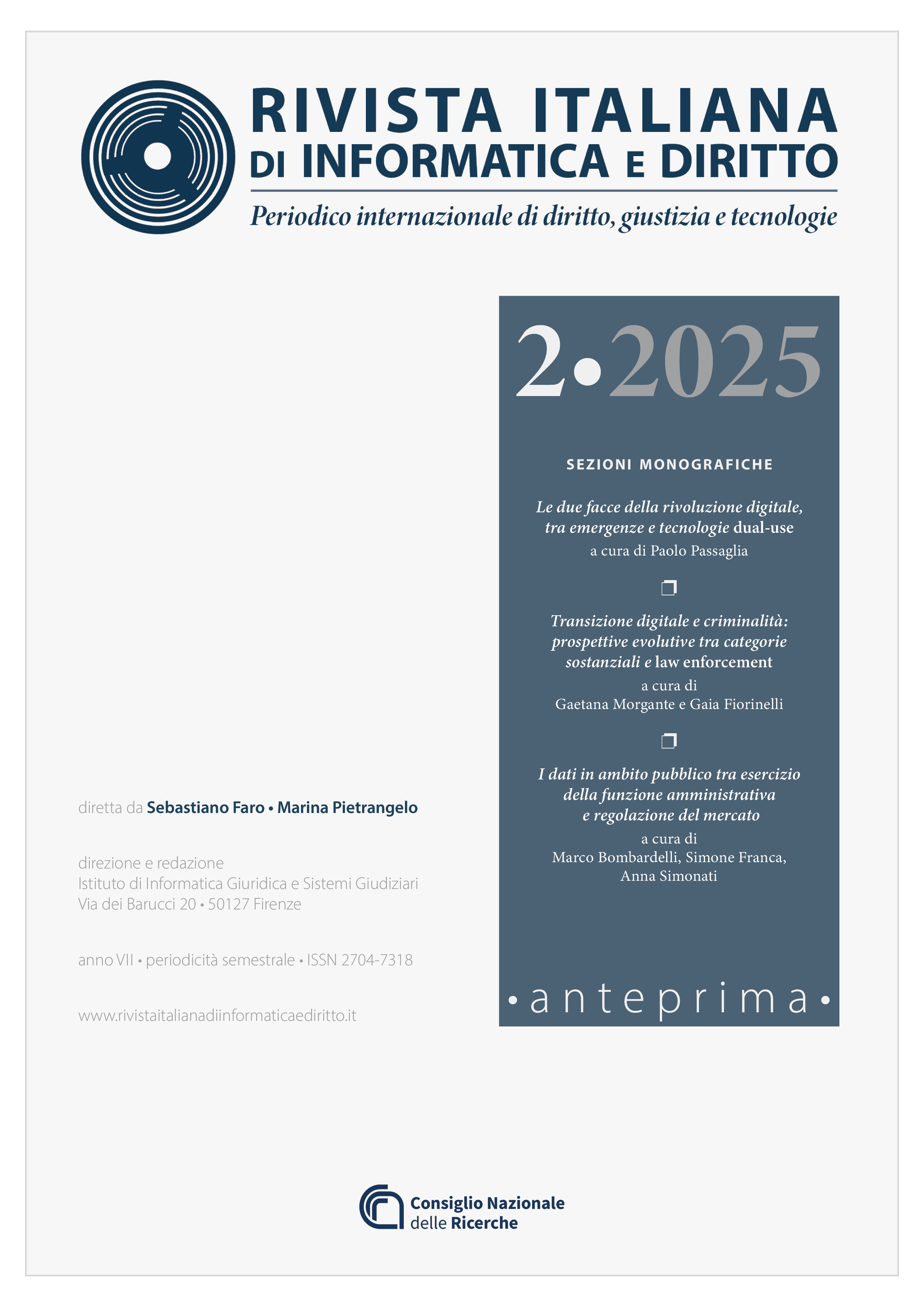Protezione dei diritti umani e intelligenza artificiale: un’analisi critica del regolamento europeo sui prodotti a duplice uso
DOI:
https://doi.org/10.32091/RIID0239Parole chiave:
Diritti umani, Intelligenza artificiale, Prodotti a duplice uso, Unione europeaAbstract
Questo testo si propone di analizzare l’adeguatezza della protezione dei diritti umani nel contesto del regolamento europeo sui prodotti a duplice uso. Dopo aver esaminato come il legislatore europeo abbia progressivamente integrato nella regolamentazione sui prodotti a duplice uso considerazioni in materia di diritti umani, il testo esplora come rimangano certe limitazioni nel quadro normativo attuale. In particolare, viene messa in discussione la capacità della normativa europea di garantire la certezza del diritto, essenziale per una applicazione uniforme e rispettosa dei diritti fondamentali. In tal modo, questo studio mira a contribuire a una comprensione più profonda delle possibili interazioni che emergono a livello normativo circa la protezione dei diritti umani e la politica europea commerciale comune in materia di prodotti a duplice uso e nel contesto della intelligenza artificiale.
Riferimenti bibliografici
Amnesty International (2020), Out of Control: Failing EU Laws for Digital Surveillance Export, Report, Amnesty International, 2020
BDI (2016), EC Dual-Use: Review of the EC Dual-Use Regulation, 2016
M. Bromley (2023), The EU Dual-use Regulation, cyber-surveillance and human rights: the competing norms and organised hypocrisy of EU export controls, in “Defence Studies”, vol. 23, 2023, n. 4
DIGITALEUROPE (2018), Updated DIGITALEUROPE Comments on Proposal for Recast of Export Control Regulation, 2018
E. Di Franco (2022), Assessing the role of human rights in the Recast EU Regulation on dual-use items, Trans European Policy Studies Association Briefs, 2022
J. Donnelly (2013), Universal human rights in theory and practice, Cornell University Press, 2013
J. Donnelly (1982), Human rights and human dignity: An analytic critique of non-Western conceptions of human rights, in “American Political Science Review”, vol. 76, 1982, n. 2
A. Fruscione (2022), Dual Use Items: A Whole New Export Regulation in the European Union, in “Global Trade and Customs Journal”, vol. 17, 2022, n. 3
M.C. Horowitz (2019), When speed kills: Lethal autonomous weapon systems, deterrence and stability, in “Journal of Strategic Studies”, vol. 42, 2019, n. 6
U. Jaremba, M. Kanetake, I. Koning (2019), Economic and Non-Economic Values and Objectives in the EU’s International Trade: Normative Tensions, Actors and Processes, in “Europe and the World: A Law Review”, vol. 3, 2019, n. 1
M. Kanetake (2020), The EU’s Dual-Use Export Control and Human Rights Risks: The Case of Cyber Surveillance Technology, in “Europe and the World: A Law Review”, vol. 3, 2019, n. 1
K.L. Meissner, K. Urbanski (2022), Feeble Rules: One Dual-Use Sanctions Regime, Multiple Ways of Implementation and Application?, in “European Security”, vol. 31, 2022
A. Quintavalla, J. Temperman (2023), Artificial intelligence and human rights, Oxford University Press, 2023
L. Riecke (2023), Unmasking the Term ‘Dual Use’ in EU Spyware Export Control, in “European Journal of International Law”, vol. 34, 2023, n. 3
S. Schmid, T. Riebe, C. Reuter (2022), Dual-use and trustworthy? A mixed methods analysis of AI diffusion between civilian and defense R&D, in “Science and engineering ethics”, vol. 28, 2022, n. 2
D. Trusilo, D. Danks (2024), Commercial AI, Conflict, and Moral Responsibility: A theoretical analysis and practical approach to the moral responsibilities associated with dual-use AI technology, in “arXiv”, 2402.01762, 2024
O.L. Van Daalen, J.V.J. Van Hoboken, M. Rucz (2023), Export control of cybersurveillance items in the new dual-use regulation: The challenges of applying human rights logic to export control, in “Computer Law & Security Review”, vol. 48, 2023
Dowloads
Pubblicato
Fascicolo
Sezione
Licenza
Copyright (c) 2025 Rivista italiana di informatica e diritto

Questo volume è pubblicato con la licenza Creative Commons Attribuzione - Non commerciale - Condividi allo stesso modo 4.0 Internazionale.















